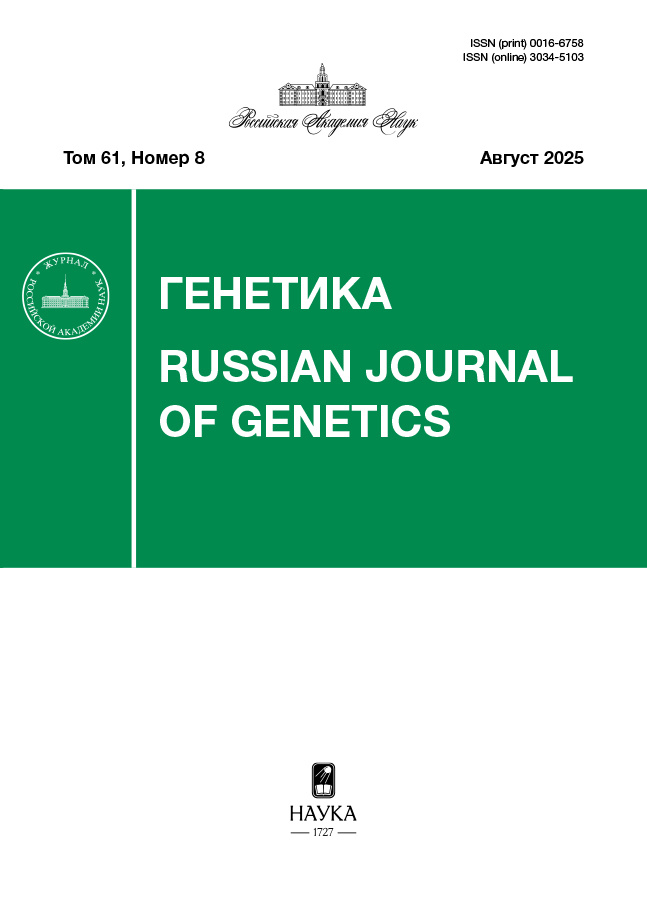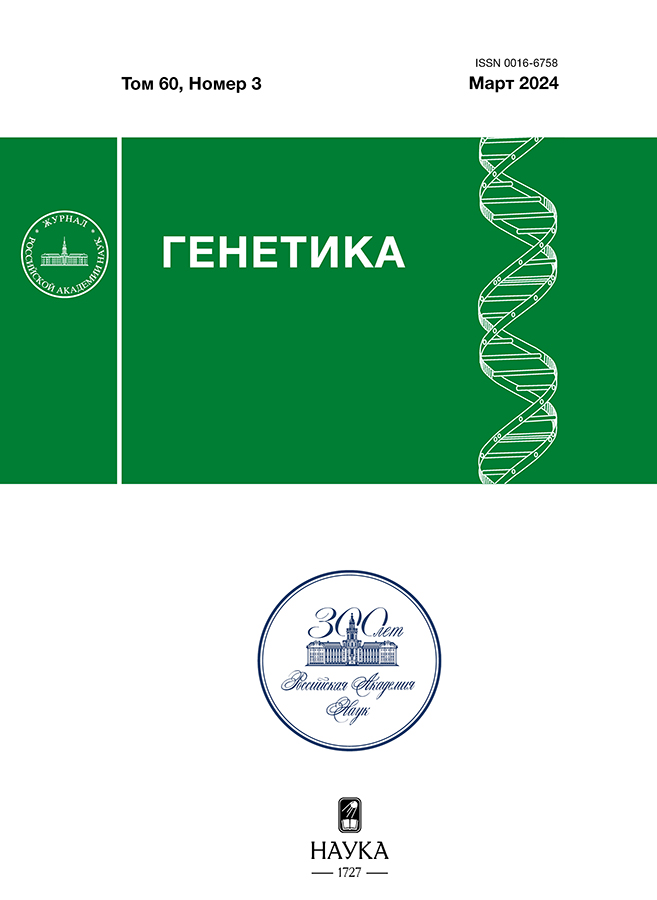Исследование связи между полиморфизмом гена окситоцинового рецептора, невзгодами детства и негативными симптомами шизофрении
- Авторы: Лежейко Т.В.1, Михайлова В.А.1, Габаева М.В.1, Голимбет В.Е.1
-
Учреждения:
- Научный центр психического здоровья
- Выпуск: Том 60, № 3 (2024)
- Страницы: 104-109
- Раздел: КРАТКИЕ СООБЩЕНИЯ
- URL: https://ter-arkhiv.ru/0016-6758/article/view/666978
- DOI: https://doi.org/10.31857/S0016675824030114
- EDN: https://elibrary.ru/DOGDMT
- ID: 666978
Цитировать
Полный текст
Аннотация
Известно, что нейрогормон окситоцин играет важную роль в патогенезе психических заболеваний, а также моделирует связь между стрессовыми факторами, особенно действующими на ранних этапах развития, и развитием психических расстройств. Основываясь на этих данных, мы исследовали эффекты взаимодействия средового фактора, в качестве которого рассматривали невзгоды детства (НД) и генотипов гена окситоцинового рецептора (OXTR) в полиморфных сайтах rs4686302 и rs7632287 на выраженность негативных симптомов шизофрении. В исследовании приняли участие 592 больных шизофренией (рубрики F20. по МКБ-10). Информация о наличии НД была получена из историй болезни и опроса пациента и ближайших родственников. Для статистической обработки данных применяли ковариационный анализ (GML); при post-hoс попарном сравнении применяли критерий Тьюки. Выявлен значимый эффект взаимодействия НД и полиморфизма гена OXTR rs7632287(G/A) на выраженность негативных симптомов у больных шизофренией. У больных без НД полиморфизмы не оказывали значимого эффекта на изучаемый фенотип. Таким образом, в нашем исследовании впервые показано, что полиморфизм rs7632287(G/A) и НД оказывают взаимное влияние на тяжесть негативных симптомов шизофрении.
Ключевые слова
Полный текст
Об авторах
Т. В. Лежейко
Научный центр психического здоровья
Автор, ответственный за переписку.
Email: Lezheiko@list.ru
Россия, Москва, 115522
В. А. Михайлова
Научный центр психического здоровья
Email: Lezheiko@list.ru
Россия, Москва, 115522
М. В. Габаева
Научный центр психического здоровья
Email: Lezheiko@list.ru
Россия, Москва, 115522
В. Е. Голимбет
Научный центр психического здоровья
Email: Lezheiko@list.ru
Россия, Москва, 115522
Список литературы
- Radua J., Ramella-Cravaro V., Ioannidis J.P.A. et al. What causes psychosis? Аn umbrella review of risk and protective factors // World Psychiatry. 2018. V. 17. № 1. P. 49–66. https://doi.org/10.1002 /wps.20490
- Robinson N., Bergen S.E. Environmental risk factors for schizophrenia and bipolar disorder and their relationship to genetic risk: Current knowledge and future directions // Front. Genetics. 2021. V. 12. https://doi.org/10.3389/fgene.2021.686666
- Harvey P.D., Deckler E., Jarskog F.et al. Predictors of social functioning in patients with higher and lower levels of reduced emotional experience: Social cognition, social competence, and symptom severity // Schizophrenia Res. 2019. V. 206. P. 271–276. https://doi.org/10.1016/j.schres. 2018.11.005
- Mäki P., Veijola J., Jones P.B. et .al. Predictors of schizophrenia // British Med. Bull. 2005. V. 9. P. 73–74. https://doi.org/10.1093/bmb/ldh046
- Reichenberg A. The assessment of neuropsychological functioning in schizophrenia // Dialogues in Clin. Neuroscience. 2010. V. 12. № 3. P. 383–392. https://doi.org/10.31887/DCNS.2010.12.3
- Feldman R., Monakhov M., Pratt M. et al. Oxytocin pathway genes: Evolutionary ancient system impacting on human affiliation, sociality, and psychopathology // Biol.Psychiatry. 2016. V. 79. № 3. P. 174–184. https://doi.org/10.1016/j.biopsych.2015.08.008
- Marsh N., Marsh A.A., Lee M.R. et al. Oxytocin and the neurobiology of prosocial behavior // Neuroscientist. 2021. V. 27. № 6. P. 604–619. https://doi.org/10.1177/1073858420960111
- Strauss G.P., Chapman H.C., Keller W.R. et al. Endogenous oxytocin levels are associated with impaired social cognition and neurocognition in schizophrenia // J. Psychiatric Res. 2019. V. 12. P. 38–43. https://doi.org/0.1016/j.jpsychires.2019.02.017
- Ettinger U., Hurlemann R., Chan R.C.K. Oxytocin and schizophrenia spectrum disorders // Curr. Topics in Behavioral Neurosciences. 2018. V. 35. P. 515–527. https://doi.org/10.1007/7854_2017_27
- Malhi G.S., Das P., Outhred T. et al. Interactions of OXTR rs53576 and emotional trauma on hippocampal volumes and perceived social support in adolescent girls // Psychoneuroendocrinology. 2020. V. 115. https://doi.org/10.1016/j.psyneuen.2020.104635
- Zheng S., Masuda T., Matsunaga M. et al. Oxytocin receptor gene (OXTR) and childhood adversity influence trust // Psychoneuroendocrinology. 2020. V. 121. https://doi.org/10.1016/j.psyneuen.2020.104840
- Zwicker A., Denovan-Wright E.M., Uher R. Gene-environment interplay in the etiology of psychosis // Psychol. Medicine. 2018. V. 48. № 12. P. 1925–1936. https://doi.org/10.1017/S003329171700383X
- Montag C., Brockmann E.M., Bayerl M. et al. Oxytocin and oxytocin receptor gene polymorphisms and risk for schizophrenia: A case-control study // World J. Biol. Psychiatry. 2013. V. 14. № 7. P. 500–508. https://doi.org/10.3109/15622975.2012.677547
- Mongan D., Ramesar M., Föcking M. et al. Role of inflammation in the pathogenesis of schizophrenia: A review of the evidence, proposed mechanisms and implications for treatment // Early Interv. Psychiatry. 2020. V. 14. № 4. P. 385–397. https://doi.org/10.1111/eip.12859
- Womersley J.S., Hemmings S.M.J., Ziegler C. et al. Childhood emotional neglect and oxytocin receptor variants: Аssociation with limbic brain volumes // World J. Biol. Psychiatry. 2020. V. 21. № 7. P. 513–528. https://doi.org/110.1080/15622975.2019.1584331
- Михайлова В.А., Лежейко Т.В., Колесина Н.Ю., Голимбет В.Е. Исследование связи между генами окситоцинэргической системы, перинатальными осложнениями и формированием межличностных отношений у больных шизофренией // Журнал неврол. и психиатрии м. С.С. Корсакова. 2021. T. 121. № 10. C. 95–100. https://doi.org/10.17116/jnevro202112110195
- Veras A.B., Getz M., Froemke R.C. et al. Rare missense coding variants in oxytocin receptor (OXTR) in schizophrenia cases are associated with early trauma exposure, cognition and emotional processing // Psychiatric Res. 2018. V. 97. P. 58–64. https://doi.org/10.1016/j.jpsychires.2017.11.011
- Campbell D.B, Datta D., Jones S.T. et al. Association of oxytocin receptor (OXTR) gene variants with multiple phenotype domains of autism spectrum disorder // J. of Neurodevelopmental Disorders. 2011. V. 3. № 2. P. 101–112. https://doi.org/10.1007/s11689-010-9071-2
- Walum H., Lichtenstein P., Neiderhiser J.M. et al.Variation in the oxytocin receptor gene is associated with pair-bonding and social behavior // Biol. Psychiatry. 2012. V. 71. № 5. P. 419–426. https://doi.org/10.1016/j.biopsych.2011.09.002
- Wu N, Li Z., Su Y. The association between oxytocin receptor gene polymorphism (OXTR) and trait empathy // J. of Affective Disorders. 2012. V. 138. № 3. P. 468–472. https://doi.org/10.1016/j.jad.2012.01.009
- Hovey D., Lindstedt M., Zettergren A. et al. Antisocial behavior and polymorphisms in the oxytocin receptor gene: Findings in two independent samples // Mol. Psychiatry. 2016. V. 21. №7. P. 983–938. https://doi.org/10.1038/mp.2015.144
- LoParo D., Waldman I.D. The oxytocin receptor gene (OXTR) is associated with autism spectrum disorder: A meta-analysis // Mol. Psychiatry. 2015. V. 20. № 5. P. 640–646. https://doi.org//10.1038/mp.2014.77
- Westberg L., Henningsson S., Zettergren A. et al. Variation in the oxytocin receptor gene is associated with face recognition and its neural correlates // Front. Behav, Neurosci. 2016. V. 10. https://doi.org/10.3389/fnbeh.2016.00178
- Kalmakis K.A., Chandler G.E. Adverse childhood experiences: Towards a clear conceptual meaning // J. Adv. Nursing. 2014. V. 70. № 7. P. 1489–1501. https://doi.org/10.1111/jan.12329
- Reichl C., Kaess M., Fuchs A. et al. Childhood adversity and parenting behavior: The role of oxytocin receptor gene polymorphisms // Neural Transmission. 2019. V. 126. № 6. P. 777–787. https://doi.org/10.1007/s00702-019-02009-9
- Popovic D., Schmitt A., Kaurani L. et al. Childhood trauma in schizophrenia: Current findings and research perspectives // Front. Neurosci. 2019. V. 13. P. 274. https://doi.org/10.3389/fnins.2019.00274
- Kogan S.M., Bae D., Cho J. et al. Childhood adversity, socioeconomic instability, oxytocin-receptor-gene methylation, and romantic-relationship support among young african american men // Psychol. Sci. 2019. V. 30. № 8. P. 1234–1244. https://doi.org/0.1177/0956797619854735
- Алфимова М.В., Коровайцева Г.И., Габаева М.В. и др. Генетический полиморфизм цитокинов ИЛ-1β, ИЛ-4 и TNF-α как фактор, модулирующий влияние невзгод детства на симптоматику шизофрении // Журн. неврол. и психиатрии им. С.С. Корсакова. 2022. T. 122. № 9. C. 110–117. https://doi.org/10.17116/jnevro202212209111023.
- Kalyouncu T., Ozbaran B., Kose S. et al. Variation in the oxytocin receptor gene is associated with social cognition and ADHD // J. of Attention Disorders. 2019. V. 23. № 7. P. 702–711. https://doi.org/10.1177/1087054717706757
- Meyer M., Jurek B., Alfonso-Prieto M. et al. Structure-function relationships of the disease-linked A218T oxytocin receptor variant // Mol. Psychiatry. 2022. V. 27. № 2. P. 907–917. https://doi.org/10.1038/s41380-021-01241-8
- Chang S.C., Glymour M.M., Rewak M. et al. Are genetic variations in OXTR, AVPR1A, and CD38 genes important to social integration? Results from two large U.S. cohorts // Psychoneuroendocrinology. 2014. V. 39. P. 257–268. https://doi.org/10.1016/j.psyneuen. 2013.09.024
- Kohlhoff J., Cibralic S., Hawes D.J. et al. Oxytocin receptor gene (OXTR) polymorphisms and social, emotional and behavioral functioning in children and adolescents: A systematic narrative review // Neuroscience & Biobehavioral Reviews. 2022. V. 135. P. 104573. https://doi.org/10.1016/j.neubiorev.2022.104573
- Bey K., Campos-Martin R., Klawohn J. et al. Hypermethylation of the oxytocin receptor gene (OXTR) in obsessive-compulsive disorder: Further evidence for a biomarker of disease and treatment response // Epigenetics. 2022. V. 17. № 6. P. 642–652. https://doi.org/10.1080/15592294.2021.1943864
- Muros N.I., García A.S., Forner C. et al. Facial affect recognition by patients with schizophrenia using human avatars // J. Clin. Medicine. 2021. V. 28. № 9. https://doi.org/10.3390/jcm10091904
Дополнительные файлы











